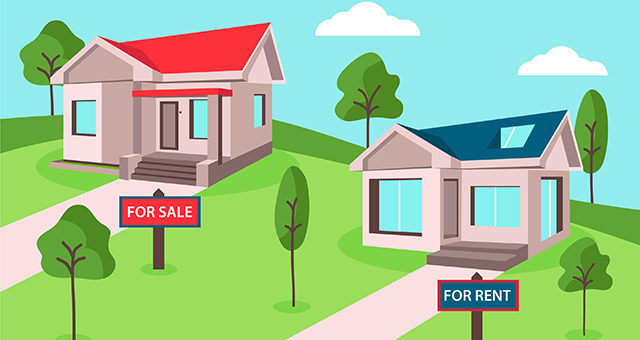
Renting Or Buying A Home: Which Is The Better Financial Option For You?
For generations, homeownership has been the American Dream and has represented prosperity or success. However, in recent years, the numbers have been shifting towards home rentals. This change is across all age groups and not just millennials who are thought to favour the flexibility and freedom of renting. But, according to a survey by the Pew Research Centre in 2016, “72% of renters said that they would like to buy a house at some point”. This gives us a perfect understanding that the idea of homeownership is still the goal for the majority of Americans.
However, renting or buying a home is an extremely personal decision and depends on many factors. If you are on the fence about whether you should continue renting or own a home, here are some questions to deliberate upon before you make your first move.
1. Can You Qualify For A Mortgage?
Unless you have sufficient funds to purchase a house with cash, you will need to get a mortgage. So, before you start dreaming of your new home, get in touch with a lender to find out whether you qualify for a loan. Some of the important factors that lenders take into account to approve a mortgage are job stability, credit history, and assets. They will also tell you how much of a mortgage you qualify for by calculating your debt-to-income ratio.
If you qualify for a mortgage, then your next step will be looking for a home that fits your budget. If not you should work on strengthening your finances.
2. Can You Afford The Costs?
Another factor to consider is the cost. Purchasing a home involves more money out of pocket like down payment, closing costs, property taxes, and possibly homeowner’s association fees.
Depending on the type of mortgage you apply for you may be able to purchase a home with a minimum 3% down payment and/or closing costs rolled into the mortgage loan. However, lenders may charge for private mortgage insurance if your down payment is less than 20% and the interest rates will be higher. So, you need to talk to a mortgage lender about the mortgage types and options available.
There are also tax deductions that can offset some homeownership costs. However, according to The Tax Cuts and Jobs Act of 2017 you are allowed deductions of interest up to $750,000 of a mortgage value, and deductions for state and local taxes (including property tax) are capped at $10,000. But, according to a National Association of REALTORS® report a homeowner’s mortgage payment will be less than a renter’s payment after 6 years. This is presuming that the rent increases by 5% every year and the homeowner is paying a fixed monthly mortgage payment
3. How Long Do You Plan To Stay In The Same Place?
Next, you need to take a look at your present circumstances and think about where you would be in the next five years. If you have a definite area tied to it then purchasing a home is a good fit both financially and emotionally.
According to financial experts, if you stay in the home for at least 3 to 5 years then you will hopefully build enough home equity to offset the initial cost of the purchase and any transaction costs involved when you decide to sell. Additionally, you can put your personal touches and make the home feel like it is yours.
If you are not sure you can commit to a home for at least three years, then it might be a good idea to rent. You can put aside the money you have saved for the down payment and closing costs till you are ready to buy a home.
4. Are You Up For Maintenance?
One major plus of being a renter is that you are not responsible for most of the maintenance and repairs that homeowners have to take care of. From weekends spent on lawn care to replacing smoke detectors to major issues like burst pipes, homeownership comes with a long to-do list that can be costly as well as time-consuming. Experts recommend that every year homeowners should save 1-3% of their home’s purchase for ongoing maintenance.
Therefore, being a homeowner means that you should be willing to learn to fix things yourself or pay someone else to do it for you.
To Sum Up
At the end of the day, there is no clear answer as to whether renting or buying is the best option. Renting is not always “throwing away money” and purchasing a home is not always “a good buy”. Therefore, the decision to rent or buy should be a personal one. Ask yourself whether you are ready to stick to one location and take responsibility for other related expenses in exchange for equity in a home. Or, are you willing to sacrifice equity for flexibility to move when you want?
Carefully consider your goals, finances, and individual lifestyle before you decide one way or another.
Are you ready to take the first step towards homeownership? Contact one of our loan experts today to start a conversation about your mortgage options.


